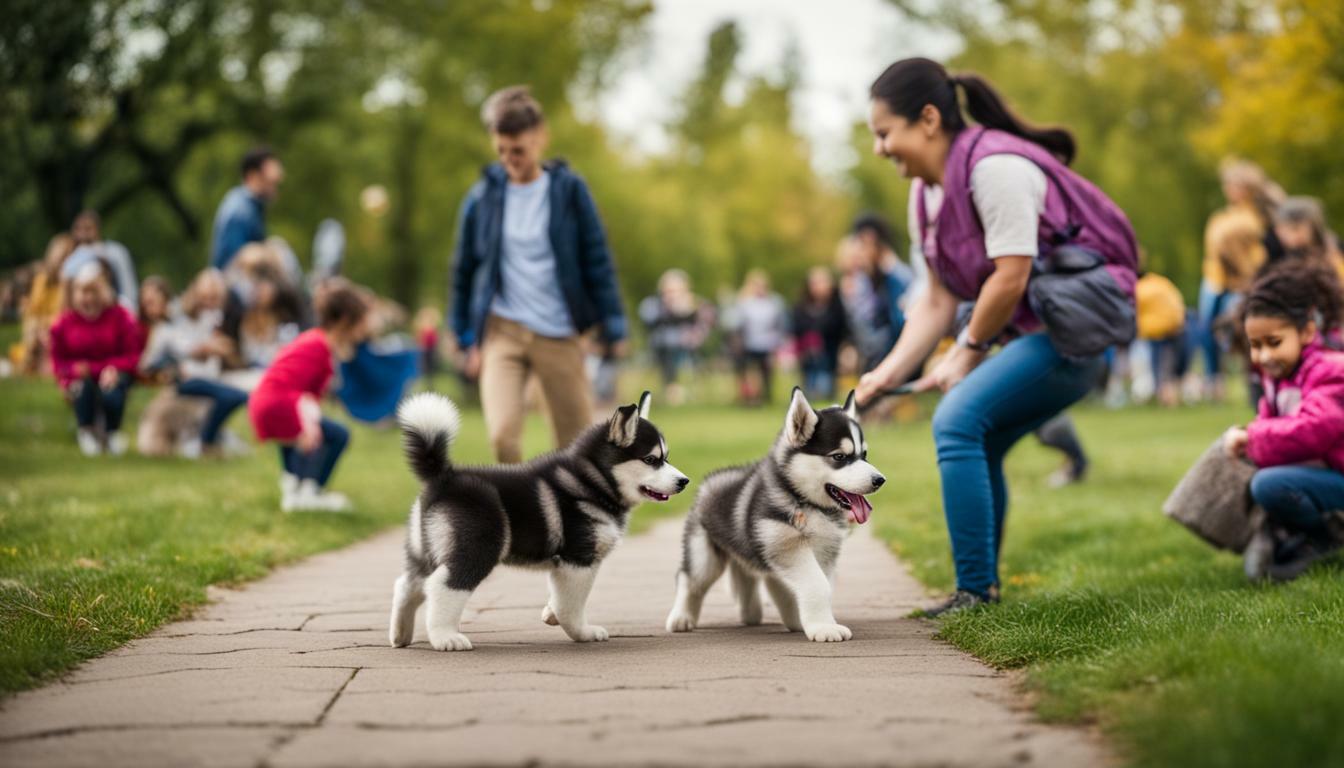Socializing a Husky puppy is crucial for their development and well-being. By following our expert guide, you can ensure that your furry friend becomes a well-adjusted and friendly pet. Proper socialization techniques will help your Husky puppy grow into a confident and sociable adult.
During the first few months, it’s important to work with a responsible breeder who prioritizes proper socialization. This early socialization lays the foundation for your Husky’s future interactions with other dogs and people.
Crate training and establishing a schedule at home are key components of socializing a Husky puppy. These routines provide structure and stability, helping your puppy feel safe and secure. Additionally, introducing grooming and nail trimming at this stage will ensure your Husky becomes comfortable with these necessary tasks.
Socializing your Husky with other dogs is another important aspect of their development. Positive interactions with other canines will teach your puppy proper social skills and help them become a well-rounded companion. It’s important to follow appropriate introductions and provide supervised playtime.
Teaching your Husky puppy to be comfortable around strangers and children is also crucial. By exposing them to new people and environments, you can prevent fear or aggression issues later in life. Our guide will provide you with techniques to help your Husky puppy navigate these situations with ease.
Obedience training and engaging in play activities are essential for a well-socialized Husky. These activities not only strengthen your bond but also provide mental stimulation and physical exercise. Continued socialization beyond the initial months is vital, and enrolling your Husky in training classes can further enhance their social skills.
As your Husky puppy reaches a year of age, it’s important to focus on preventing escape and engaging in sports training. These activities will help keep your Husky physically active and mentally stimulated. Additionally, participating in local Husky meet-up clubs can provide opportunities for socialization and playdates with other Husky owners.
Proper care and training are essential for a well-behaved Husky. This includes feeding, grooming, and setting boundaries. Potty training, crate training, leash training, and using positive reinforcement techniques like clicker training will help establish good behavior habits in your Husky puppy.
By following our comprehensive guide, you will become equipped with the knowledge and skills to effectively socialize your Husky puppy. Together, you and your furry friend can embark on a journey of growth, companionship, and lifelong happiness.
Working with a Responsible Breeder for Proper Socialization
When getting a Husky puppy, it’s essential to work with a responsible breeder who understands the importance of early socialization. A breeder who prioritizes proper socialization during the first eight weeks sets the foundation for a well-adjusted and confident dog.
A responsible breeder will ensure that the puppies are exposed to various stimuli, such as different sounds, sights, and experiences. This early socialization allows the puppies to develop into dogs that are comfortable and confident in various environments.
Additionally, a reputable breeder will introduce the puppies to different people, including children and strangers, to ensure they are friendly and sociable. This exposure helps the puppies develop positive associations with new individuals, reducing the likelihood of fear or aggression later in life.
| Benefits of Working with a Responsible Breeder | Positive Socialization Techniques |
|---|---|
| Ensures puppies are exposed to various stimuli | Introduce puppies to different sounds, sights, and experiences |
| Familiarizes puppies with different people | Expose puppies to children and strangers |
| Reduces the likelihood of fear or aggression in the future | Develop positive associations with new individuals |
Working with a responsible breeder is crucial for setting your Husky puppy on the right path towards proper socialization. Their expertise and dedication to early socialization will help ensure your puppy grows into a well-adjusted and confident adult dog.
Choosing the Right Breeder
When selecting a breeder, make sure to do your research and ask questions about their socialization practices. A responsible breeder will be transparent and provide evidence of their efforts to socialize their puppies. They may even provide testimonials from previous puppy owners who can attest to the positive results of their socialization techniques.
Remember, socialization is a critical aspect of a Husky puppy’s development, and by working with a responsible breeder, you are laying the foundation for a well-socialized and well-behaved companion.
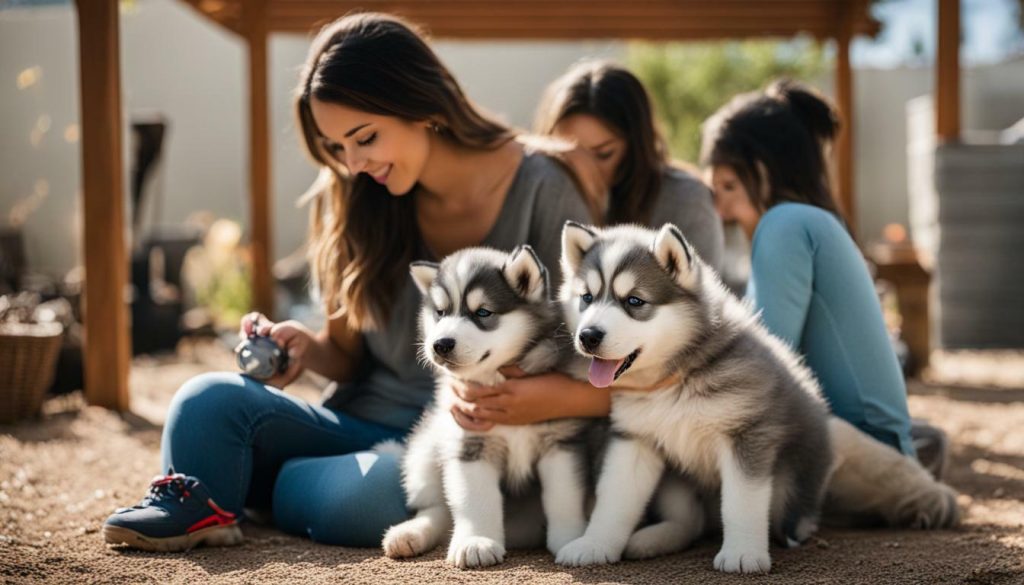
Socializing a Husky Puppy at Home: Crate Training and Establishing a Schedule
Socializing your Husky puppy at home starts with crate training them and establishing a consistent schedule. A crate provides a safe and secure space for your puppy, simulating a den-like environment that appeals to their natural instincts. Introduce the crate gradually, placing comfortable bedding and toys inside to make it inviting. Begin by leaving the crate door open and allowing your puppy to explore it at their own pace.
Once your Husky puppy is comfortable with the crate, you can start using it for short periods of time, gradually increasing the duration. This helps them learn to stay calm and relaxed even when you’re not around. Use positive reinforcement techniques, such as treats and praise, to encourage your puppy to go into the crate willingly. Avoid using the crate as punishment, as this can create negative associations.
In addition to crate training, establishing a schedule is crucial for socializing your Husky puppy at home. Dogs thrive on routine, so aim to feed them, take them out for potty breaks, and engage in playtime at the same times each day. Consistency helps your puppy develop a sense of predictability, making them feel more secure and confident in their environment.
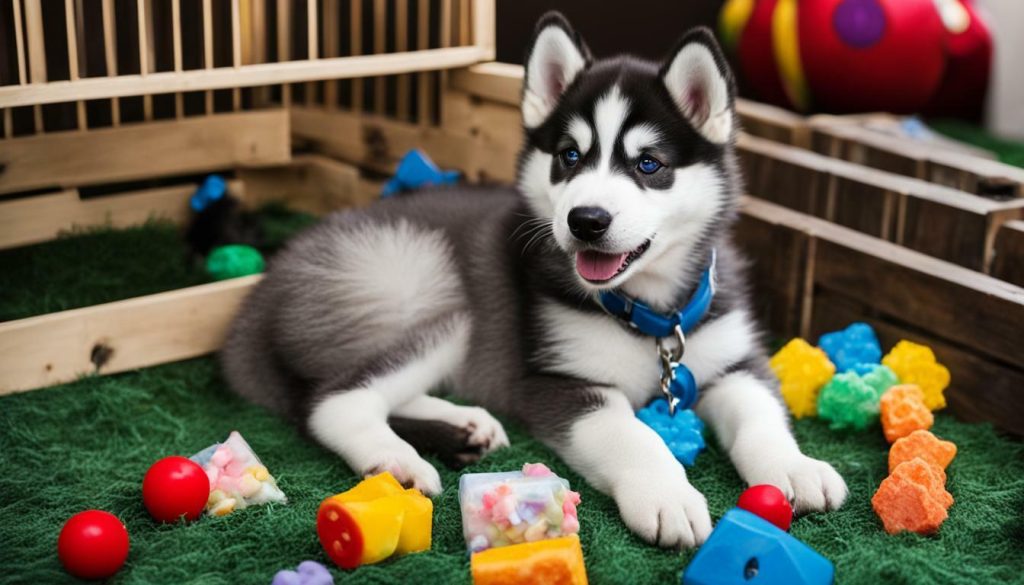
| Activity | Time |
|---|---|
| Feeding | 7:00 AM and 6:00 PM |
| Potty Break | 8:00 AM, 12:00 PM, 4:00 PM |
| Playtime | 9:00 AM and 3:00 PM |
| Training Session | 10:00 AM and 5:00 PM |
| Walk or Exercise | 11:00 AM and 7:00 PM |
By following a schedule, you provide structure and consistency to your Husky puppy’s day, which aids in their socialization process. It helps them understand what is expected of them and promotes good behavior. Remember to also incorporate regular grooming sessions and nail trims to familiarize your puppy with essential care routines and ensure their well-being.
Introducing Socialization with Other Dogs
Introducing your Husky puppy to other dogs is a vital part of their socialization journey. Socializing a husky puppy with other dogs helps them learn appropriate behavior, improve their communication skills, and build confidence in different social situations. By exposing your Husky to a variety of dog breeds, sizes, and temperaments, you can help them develop into a well-rounded and friendly adult.
When introducing your Husky to other dogs, it’s important to start with controlled and supervised interactions. Find a neutral space, like a park or a friend’s backyard, where the dogs can meet on neutral ground. Keep the initial meetings short and positive, allowing the dogs to sniff and interact while closely monitoring their behavior. Remember, positive experiences are key to successful socialization.
“Socializing a husky puppy with other dogs is crucial for their well-being and development. By exposing them to different dogs, you can help them build social skills and prevent issues like aggression or fearfulness later in life.”
Gradually increase the duration and complexity of the interactions as your Husky becomes more comfortable. It’s essential to closely observe their body language during play and intervene if there are any signs of discomfort or aggression. Always reward good behavior and provide plenty of praise and treats to reinforce positive associations with other dogs.
Table: Socializing a Husky Puppy with Other Dogs
| Steps for Successful Introductions | Tips |
|---|---|
| 1. Choose a neutral space | Find a location where both dogs can meet without feeling territorial. |
| 2. Keep interactions short and positive | Allow the dogs to sniff and interact in a controlled manner while keeping a close eye on their behavior. |
| 3. Gradually increase the duration and complexity | As your Husky becomes more comfortable, extend the playtime and introduce different types of interactions like playing fetch together. |
| 4. Observe body language | Watch for signs of discomfort or aggression and intervene if necessary. |
| 5. Reward and reinforce positive behavior | Use treats and praise to reinforce good behavior and create positive associations with other dogs. |
By following these steps and providing your Husky with positive experiences, you can help them develop strong socialization skills and become a friendly and well-adjusted member of the canine community.
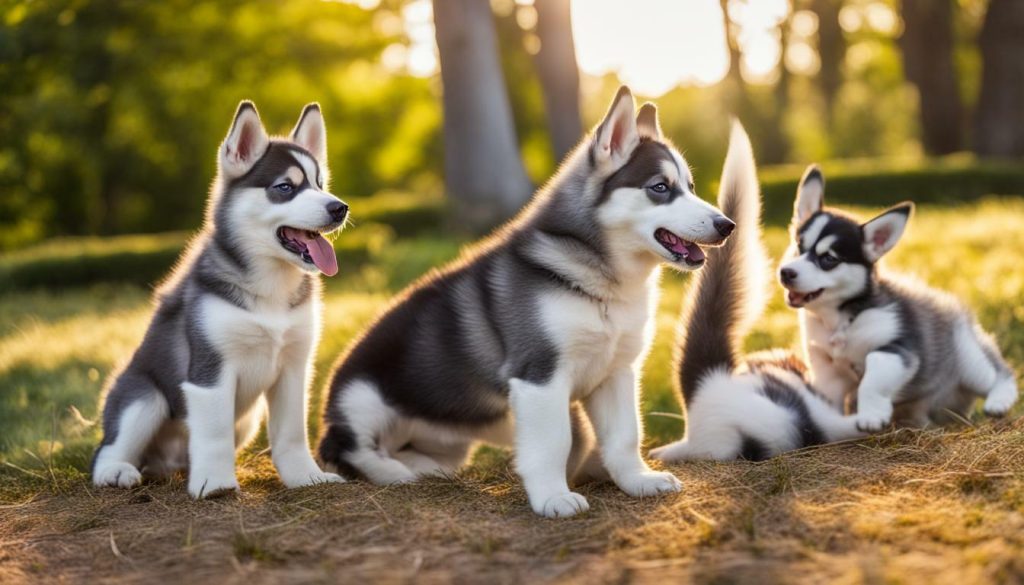
Teaching your Husky puppy to socialize with both strangers and children is essential for their development and overall behavior. By exposing them to a variety of people from an early age, you can help them become well-adjusted and friendly companions. Here are some tips to ensure positive socialization with strangers and children:
1. Start with familiar faces: Begin socializing your Husky puppy by introducing them to family members, friends, and neighbors. These familiar faces will help build their confidence and create a positive association with meeting new people.
2. Gradually increase exposure: Once your puppy feels comfortable with familiar faces, gradually expose them to new people in different settings. Start with quiet environments and slowly introduce more stimulating environments, such as parks or busy streets.
3. Use positive reinforcement: Reward your Husky puppy with treats, praise, and affection when they interact calmly and positively with strangers and children. This positive reinforcement will reinforce their good behavior and help them associate socialization with positive experiences.
4. Teach proper behaviors: It’s important to teach your Husky puppy appropriate behaviors when interacting with strangers and children. This includes teaching them not to jump, nip, or bark excessively. Consistency and positive reinforcement will help them learn how to behave politely in social situations.
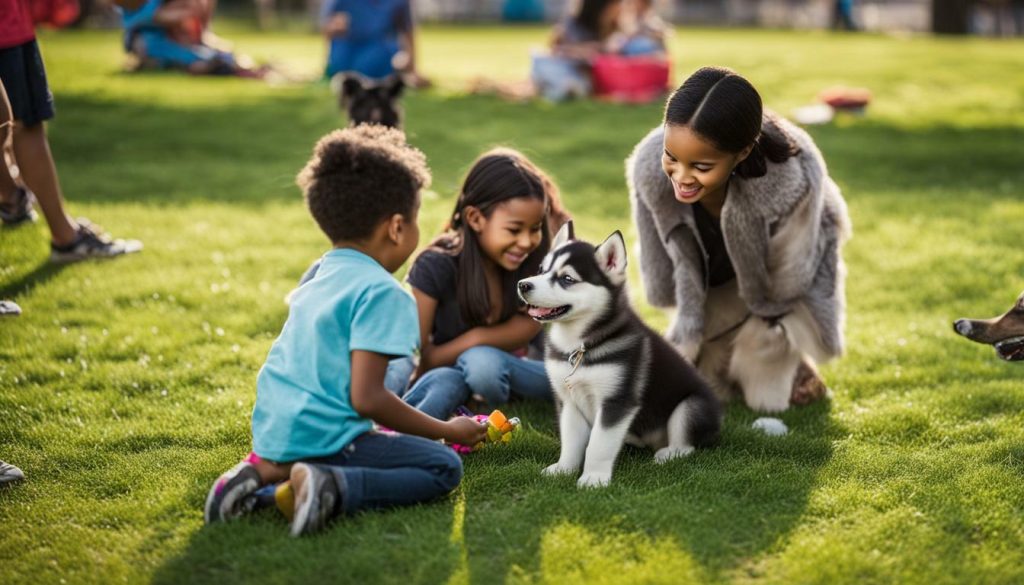
| Socialization Age | Activities |
|---|---|
| 8-14 weeks |
|
| 4-6 months |
|
| 6-12 months |
|
“Socializing a Husky puppy with strangers and children contributes to their overall behavior and helps them become well-adjusted and friendly companions.”
Remember, each Husky puppy is unique, and their socialization progress may vary. Patience, consistency, and positive reinforcement are key to successful socialization. By investing time and effort in socializing your Husky puppy, you will help them develop into a confident, well-behaved, and happy dog.
Obedience Training and Keeping Your Husky Active Through Play
Obedience training and playtime are crucial aspects of socializing your Husky puppy and ensuring their well-rounded development. Starting obedience training at an early age helps establish a strong foundation for discipline and good behavior. Teaching basic commands such as sit, stay, and come not only strengthens the bond between you and your puppy but also helps them understand their role in the family hierarchy. Remember to use positive reinforcement, such as treats and praise, to reward your Husky for good behavior.
In addition to obedience training, keeping your Husky active through regular play sessions is essential for their mental and physical well-being. Huskies are energetic dogs that require plenty of exercise to stay happy and healthy. Engage in interactive games like fetch or frisbee that allow your puppy to burn off excess energy. This also helps reinforce positive behaviors and provides an outlet for their natural instincts.
| Benefits of Obedience Training and Play: | Activities to Keep Your Husky Active: |
|---|---|
|
|
Remember to consider your Husky’s individual needs and capabilities when designing an exercise routine. Gradually increase the intensity and duration of play as your puppy grows and develops. This will help them stay mentally stimulated and prevent them from becoming bored or destructive.
By incorporating obedience training and playtime into your Husky’s daily routine, you can ensure they receive the socialization and physical activity they need to thrive. Remember to be patient and consistent in your training efforts, and always prioritize positive reinforcement to encourage your puppy’s desired behaviors.
Quote:
“Obedience training is not just about teaching your Husky to respond to commands. It’s about building a strong relationship based on trust and respect, which will benefit both you and your furry friend.” – Professional Dog Trainer
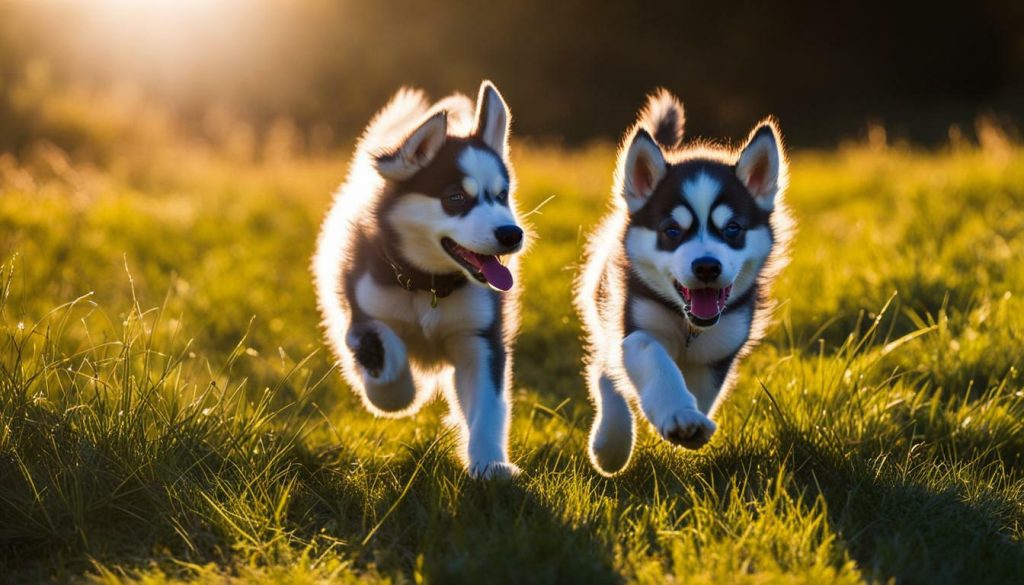
Socializing your Husky puppy is an ongoing process, and enrolling them in training classes can greatly aid in their social development. As your puppy grows, it’s important to expose them to various environments, people, and situations to help them become well-rounded and confident dogs. Training classes offer a structured environment where your Husky can interact with other dogs and learn important obedience skills.
In these classes, your furry friend will have the opportunity to socialize with other puppies, which can help them develop proper communication and play skills. It also provides a controlled setting for them to experience new sights, sounds, and smells, helping to build their confidence and reduce any fear or anxiety they may have.
During training classes, professional trainers will guide you and your Husky through various exercises that promote good behavior and strengthen your bond. They will teach you effective training techniques, such as positive reinforcement, and help you address any behavioral challenges your puppy may be facing. These classes not only focus on obedience but also on teaching valuable life skills, such as impulse control and good manners.
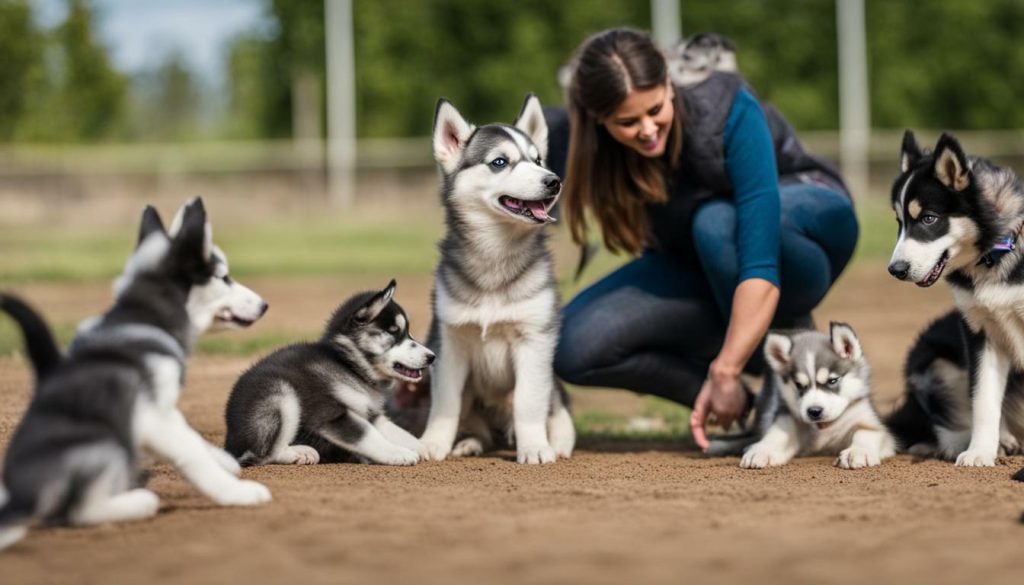
“Training classes offer a structured environment where your Husky can interact with other dogs and learn important obedience skills.”
Remember, socialization is an ongoing process, and attending training classes is just one piece of the puzzle. Continuously exposing your Husky to different environments, people, and situations will help them become a well-rounded and confident adult dog. By investing time and effort into their social development, you are setting them up for a happy and fulfilling life as a beloved member of your family.
Preventing Escape, Sports Training, and Local Husky Meet-up Clubs
As your Husky puppy grows and matures, preventing escape, sports training, and joining local Husky meet-up clubs can further enhance their socialization skills. Huskies are known for their strong prey drive and can be prone to wandering if not properly secured. It is important to ensure your yard is securely fenced with no gaps or potential escape routes. You may also consider investing in a sturdy and reliable leash or harness to prevent your Husky from slipping away during walks or outings.
Sports training is not only a great way to keep your Husky physically active but also provides an opportunity for socialization. Huskies excel in sports like agility, obedience, and flyball, which can help them burn off excess energy and build confidence. Engaging in sports training also allows your Husky to interact with other dogs and their owners, fostering positive socialization experiences in a controlled environment.
Another way to promote socialization is by joining local Husky meet-up clubs. These clubs often organize regular gatherings where Husky owners can come together with their dogs. This allows your Husky to interact with other Huskies, helping them develop important social skills and build a sense of community. These clubs may also offer training classes or workshops specifically tailored to Huskies, further enhancing their socialization and obedience skills.
| Preventing Escape | Sports Training | Local Husky Meet-up Clubs |
|---|---|---|
| Ensure secure fencing without gaps or potential escape routes. | Engage in sports like agility, obedience, and flyball. | Join local Husky meet-up clubs for regular gatherings. |
| Invest in a sturdy leash or harness for walks. | Burn off excess energy and build confidence. | Interact with other Huskies and their owners. |
| Prevent Husky from wandering or slipping away. | Foster positive socialization experiences in a controlled environment. | Develop important social skills and a sense of community. |
“Joining local Husky meet-up clubs allows your Husky to interact with other Huskies, fostering positive socialization experiences in a controlled environment.” – Husky owner
By focusing on preventing escape, engaging in sports training, and participating in local Husky meet-up clubs, you can provide your Husky with additional opportunities to socialize and develop important skills. These activities not only contribute to their overall well-being but also strengthen the bond between you and your furry companion as you embark on these adventures together.
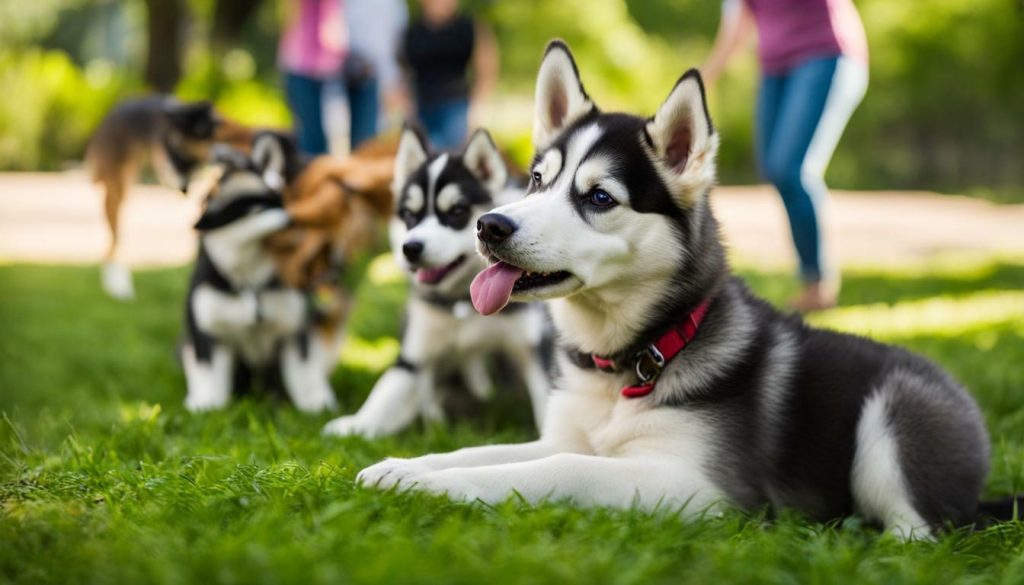
In addition to socialization, providing proper care and training is crucial for raising a well-behaved Husky puppy. From their early days, it’s important to establish a routine that includes grooming, feeding, and exercise. Regular grooming sessions, including brushing their coat and trimming their nails, should be introduced early on to help your Husky puppy become familiar and comfortable with these routines.
Obedience training is another key aspect of raising a well-behaved Husky. Teaching basic commands such as sit, stay, and come will not only ensure their safety but also enhance their overall behavior. Use positive reinforcement techniques such as treats and praise to encourage good behavior and discourage bad habits.
Keeping your Husky active through play is also essential. These energetic and intelligent dogs thrive on mental and physical stimulation. Engage in activities like fetch, puzzle toys, and agility training to keep them entertained and prevent boredom, which can lead to destructive behavior.
Continued socialization is vital for your Husky’s development. Even beyond the initial months, exposing them to new environments, people, and animals will help them become well-adjusted and confident. Enrolling your Husky in training classes can provide structured socialization opportunities and further strengthen their obedience skills.
To ensure your Husky stays safe and secure, take measures to prevent escape. Huskies are known to be skilled escape artists, so secure your yard with sturdy fences and consider using additional deterrents like dig-proof barriers or alarm systems.
To further enhance their socialization and provide an outlet for their energy, consider engaging in sports training or joining local Husky meet-up clubs. These activities can provide both mental and physical stimulation for your Husky and allow them to interact with other dogs and owners who understand their unique needs.
Proper feeding, grooming, and overall care are integral to your Husky’s well-being. Make sure to provide a balanced diet suitable for their age, size, and activity level. Regularly check their eyes, feet, and nails for any signs of infection or injury, and consult your veterinarian if needed.
Finally, setting boundaries and implementing training techniques like potty training, crate training, leash training, and clicker training are crucial components of raising a well-behaved Husky. Consistency, patience, and positive reinforcement will help shape their behavior and foster a strong bond between you and your furry companion.
FAQ
Q: Why is socializing a Husky puppy important?
A: Socializing a Husky puppy is important for their development and well-being. It helps them become comfortable around other dogs, strangers, and children, and ensures they grow up to be well-adjusted and friendly companions.
Q: How can I socialize my Husky puppy?
A: Socializing a Husky puppy starts with working with a responsible breeder who ensures proper socialization during the first eight weeks. Crate training, establishing a schedule, socializing with other dogs, and introducing them to new experiences are all key steps in the socialization process.
Q: When should I start socializing my Husky puppy?
A: Socialization should begin as early as possible, ideally during the first eight weeks of the puppy’s life. This is when they are most receptive to new experiences and learning. However, socialization should continue throughout their first year and beyond to ensure they maintain good social skills.
Q: How can I prevent my Husky puppy from escaping?
A: Preventing escape is important for the safety of your Husky puppy. This can be achieved by ensuring secure fences and gates, using leash and crate training, and providing enough mental and physical stimulation to prevent boredom and restlessness.
Q: What are some sports training activities I can engage my Husky puppy in?
A: Huskies are active and energetic dogs that thrive with sports training. Some activities you can engage them in include obedience training, agility courses, sled pulling, and hiking or jogging. These activities help keep them mentally and physically stimulated.
Q: Are there any local clubs or groups I can join to socialize my Husky puppy?
A: Yes, joining local Husky meet-up clubs or groups can be a great way to socialize your Husky puppy. These clubs often organize events where Huskies and their owners can interact with other dogs and owners, providing an opportunity for socialization in a controlled and friendly environment.
Q: How can I groom and care for my Husky puppy?
A: Grooming your Husky puppy involves regular brushing to maintain their thick coat and prevent matting. Nail trimming should also be introduced early on. It’s important to care for their eyes, feet, and nails as well. Additionally, providing proper nutrition, exercise, and veterinary care are essential for their overall health and well-being.
Q: How can I potty train my Husky puppy?
A: Potty training should begin early and consist of establishing a consistent schedule, taking the puppy outside frequently, rewarding them for eliminating in the appropriate area, and using positive reinforcement techniques. Consistency, patience, and positive reinforcement are key to successful potty training.
Q: What training methods are recommended for a well-behaved Husky?
A: Training methods such as setting boundaries, crate training, leash training, and using clicker training can be effective in teaching your Husky puppy good behavior. Consistency, positive reinforcement, and patience are important when training a Husky to ensure they understand and respond to commands.
